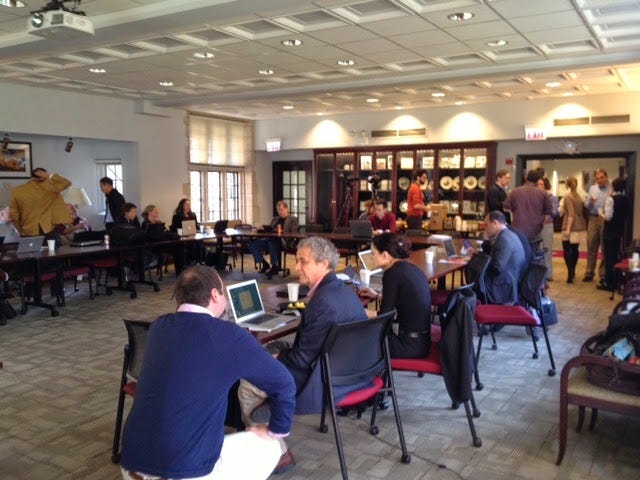In 2014 I attended the meeting Human Capital, Genetics and Behavior at the University of Chicago, organized and hosted by economist James Heckman’s institute.
Here are links to my blog posts about the meeting:
https://infoproc.blogspot.com/2014/04/human-capital-genetics-and-behavior.html
https://infoproc.blogspot.com/2014/04/two-cultures-in-chicago.html
https://infoproc.blogspot.com/2014/04/cognition-uber-alles.html
For some time, starting in the 2020 Summer of Floyd, when crazy wokism plagued America, the video and slides for my talk were censored from the conference web page. James Lee’s talk was also censored.
See here for more: https://x.com/hsu_steve/status/1768690659945316582
However, the video of my talk has now been restored:
The title is On the Genetic Architecture of Intelligence and other Quantitative Traits. Although some object to the very idea that intelligence is partly heritable, I don’t think the talk is otherwise controversial - it is mostly methodological and does not discuss group differences.
The talk is still of interest in 2024 because it shows how much has changed in the last 10 years. At the time we had no large data sets (e.g., of 100k or more genotypes) available for study.
I asserted that large amounts of heritable variance in quantitative traits would be captured in approximately additive (linear) models. You can tell by the objections from the audience that this was not broadly accepted in 2014.
I predicted that Compressed Sensing (L1-penalized regression) would allow us to construct good predictors for highly heritable traits like height. I even predicted the necessary data threshold (using scaling behavior and the Donoho-Tanner phase transition), which turns out to be 300-400k genotypes. I tried to explain this work to Heckman, but I don't believe I was successful in communicating the ideas.
I predicted that height and cognitive ability would have sparsity ~10k, which seems to be true. For height this is now verified - there are about 10k independnet common SNPs that control height. For cognitive ability the number is still not known exactly but is plausibly in the (few) x 10k range.
Ideas like embryo selection were discussed, and objections like pleiotropy were raised. It has since been shown that pleiotropy in highly polygenic traits is relatively modest.
Overall, as I predicted in 2014, the field of computational genomics has advanced considerably. The main disappointment is the still modest sample size of genotyped individuals for whom we have high-quality cognitive measurements.
I suppose I would have been surprised at the Chicago meeting if someone told me that: In 2024 a company I founded provides embryo selection to IVF parents, based on polygenic predictors, with ~100k embryos genotyped and many babies born from those embryos!
Let’s hope for substantial progress in the next decade :-)
Aurea, the first polygenically selected IVF baby.





